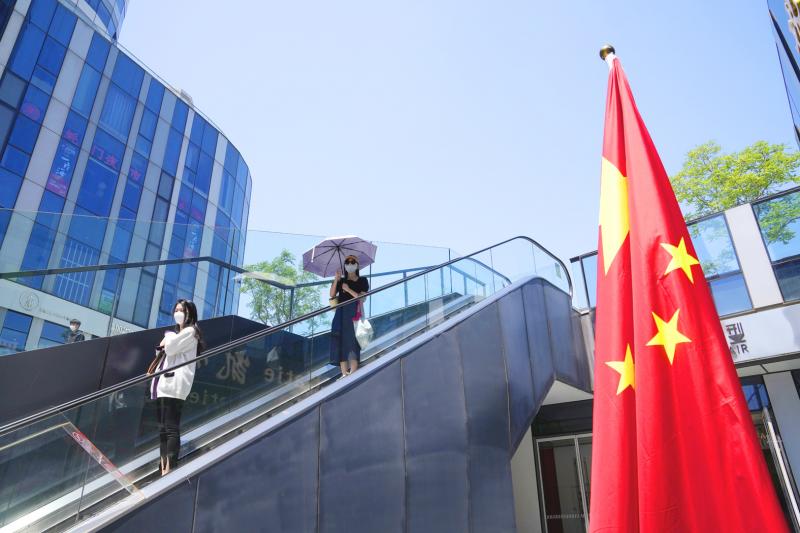Beijing’s incentives for Taiwanese businesspeople to invest in China are only intended to lure them across the Taiwan Strait, after which they receive no real support, an expert said on Sunday.
Over the past few years, Beijing has been offering a number of incentives that “benefit Taiwanese in name, while benefiting China in reality,” a cross-strait affairs expert said on condition of anonymity.
Strategies such as the “31 incentives” are intended to lure Taiwanese talent, capital and technology to help address China’s economic issues while also furthering its “united front” efforts, they said.

Photo: AP
Local governments in China do not offer much practical help once Taiwanese move there, leaving many nearly destitute if their ventures fail, they added.
There are a few hundred thousand such people in China, creating an issue for Chinese authorities, the expert said.
Beijing does not mention the risks at the outset, they said, urging Taiwanese to consider the risks before moving across the Strait.
There is an entire category of Taiwanese in China who moved there to start a business and later failed, and are now unwilling to return home out of shame, a Straits Exchange Foundation official said.
Some longtime residents have cut ties with loved ones in Taiwan, making it even harder to return, they said, adding that the foundation and Taiwanese business associations handle many cases in which families are unwilling to travel to China to handle funeral arrangements once the residents pass away.
For Taiwanese, there is considerable risk involved in starting a business in China, Cross-Strait Policy Association researcher Wu Se-chih (吳瑟致) said.
China in the past few years has set up many business parks offering incentives for Taiwanese to start businesses or work there, but after they arrive, many find that the offerings fall short of their expectations, Wu said.
Taiwanese entrepreneurs must also compete with Chinese in an unfamiliar setting, facing local governments that are unwilling to help and an economy in decline, he said.
A lack of cross-strait communication also hides the risks, including the possibility of being arrested for political reasons, he added.
“Chinese incentives for Taiwanese are only meant to trick them into moving over,” Wu said.
Whether for investment, starting a business or to work, Chinese authorities only offer consultation at best, but no practical or follow-up help, he said.
As for the issue of repatriation, Democratic Progressive Party Legislator Kuo Kuo-wen (郭國文) said not all Taiwanese in China are in need of welfare, but if they are really disadvantaged, then the Taiwanese government should offer assistance.
However, each person’s circumstances should be taken into consideration, including their age and reasons for staying in China, he said.
The government could consider offering psychological counseling, he said, adding that the nation has an obligation to help citizens return home if they wish.

An essay competition jointly organized by a local writing society and a publisher affiliated with the Chinese Communist Party (CCP) might have contravened the Act Governing Relations Between the People of the Taiwan Area and the Mainland Area (臺灣地區與大陸地區人民關係條例), the Mainland Affairs Council (MAC) said on Thursday. “In this case, the partner organization is clearly an agency under the CCP’s Fujian Provincial Committee,” MAC Deputy Minister and spokesperson Liang Wen-chieh (梁文傑) said at a news briefing in Taipei. “It also involves bringing Taiwanese students to China with all-expenses-paid arrangements to attend award ceremonies and camps,” Liang said. Those two “characteristics” are typically sufficient

A magnitude 5.9 earthquake that struck about 33km off the coast of Hualien City was the "main shock" in a series of quakes in the area, with aftershocks expected over the next three days, the Central Weather Administration (CWA) said yesterday. Prior to the magnitude 5.9 quake shaking most of Taiwan at 6:53pm yesterday, six other earthquakes stronger than a magnitude of 4, starting with a magnitude 5.5 quake at 6:09pm, occurred in the area. CWA Seismological Center Director Wu Chien-fu (吳健富) confirmed that the quakes were all part of the same series and that the magnitude 5.5 temblor was

The brilliant blue waters, thick foliage and bucolic atmosphere on this seemingly idyllic archipelago deep in the Pacific Ocean belie the key role it now plays in a titanic geopolitical struggle. Palau is again on the front line as China, and the US and its allies prepare their forces in an intensifying contest for control over the Asia-Pacific region. The democratic nation of just 17,000 people hosts US-controlled airstrips and soon-to-be-completed radar installations that the US military describes as “critical” to monitoring vast swathes of water and airspace. It is also a key piece of the second island chain, a string of

The Central Weather Administration has issued a heat alert for southeastern Taiwan, warning of temperatures as high as 36°C today, while alerting some coastal areas of strong winds later in the day. Kaohsiung’s Neimen District (內門) and Pingtung County’s Neipu Township (內埔) are under an orange heat alert, which warns of temperatures as high as 36°C for three consecutive days, the CWA said, citing southwest winds. The heat would also extend to Tainan’s Nansi (楠西) and Yujing (玉井) districts, as well as Pingtung’s Gaoshu (高樹), Yanpu (鹽埔) and Majia (瑪家) townships, it said, forecasting highs of up to 36°C in those areas